The FDA recently announced that it has reached a tentative agreement with the medical device industry (represented through trade associations) on user fees, performance goals, and other matters for the period 2013-17. The most touted aspects of the agreement are that (1) user fees will increase over 100 percent from $295 million over the last five years to $595 million over the next five years and (2) FDA's performance will be measured based on "total review time" rather than "FDA days." The agreement, which must be approved by Congress by September, includes other features that should benefit industry, and ultimately patients, by helping to expedite and improve product reviews and approvals.
The change to the measurement of review time is significant because, under prior agreements, review time was measured in FDA days and FDA could "stop the clock" by requesting additional information from the applicant. As a result, total review time (measured from the date of the application to the date of FDA decision) was increasing although FDA was technically meeting its performance goals. In addition, the tentative agreement includes substantially improved review time goals for FDA to meet. For pre-market approval applications (PMAs), the goal is for 90 percent to receive a decision within 180 days if there is no panel review compared to current performance of 70 percent receiving a decision within that time frame. Where there is a panel review, the goal is for 90 percent of PMAs to receive a decision within 320 days compared to current performance of 38 percent. For 510(k) submissions, the goal is for 95 percent to receive a decision within 90 days compared to 90 percent currently.
The tentative agreement also includes process improvements that should benefit medical device manufacturers and patients. One improvement is a "mid-submission review," i.e ., a meeting between FDA and the applicant halfway through the review period to give the applicant time to respond to questions the FDA reviewer may have, hopefully preventing delay in approval from requests for additional information. A second improvement has been dubbed "no submission left behind" (NSLB). Under prior agreements, once FDA exceeded its review time performance goal for a particular application, it is believed the application could find its way to the bottom of the stack. The NSLB agreement requires a meeting between FDA and the applicant once the goal has been missed to create a plan for FDA to complete work on the application. A third improvement will require FDA to comply with any agreements it reaches with a manufacturer in a pre-submission meeting. Companies will be allowed to submit the first draft of minutes of such meetings to ensure any FDA commitments are appropriately captured.
Finally, the tentative agreement includes provisions for improved reporting of FDA's performance with respect to the new goals. It requires quarterly and annual reports on key metrics, including total review time, withdrawal of applications, the number of "not substantially equivalent" determinations, and the number of requests for additional information and review cycles. The agreement calls for an independent consultant to study FDA's management of the review process and for FDA to adopt a corrective action plan to implement improvements to the process.



 i
i


